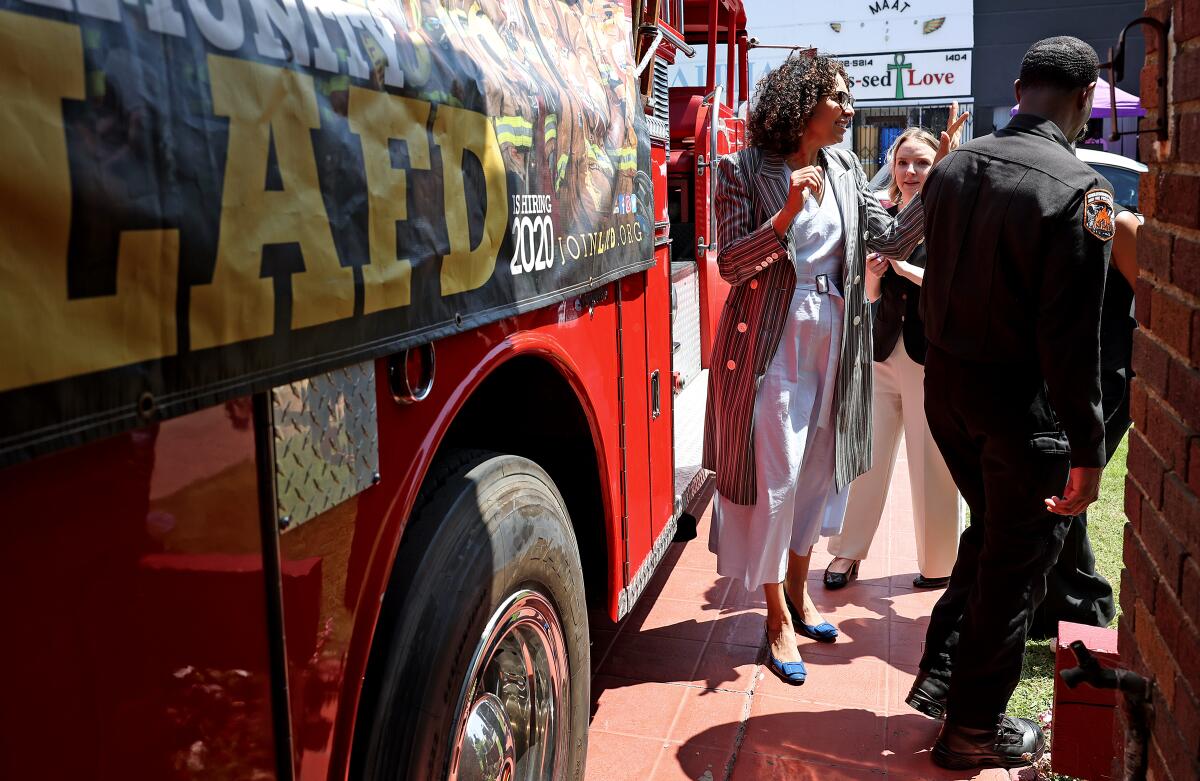Under Fire Act, inmate firefighters could have a new pipeline to employment

- Share via
When Andony Corleto first joined California’s Conservation Fire Camp Program as a prison inmate, he knew his criminal history barred him from working for any city, county or state fire department upon release.
“Thousands of people like me have had their trial by fire, only to be released and been told that it’s worth nothing,” said Corleto, who now works with Vera Institute of Justice, a national organization focused on criminal justice reform. “We cannot throw them away. We cannot deny them protections and fair wages while they work to keep us safe, especially with the persistent shortage of firefighters and with record making fires every year.”
Now, with the Fire Act, this could all change.
Introduced by California Democratic Reps. Sydney Kamlager-Dove and Judy Chu, the new act would help fund job training, workplace and mentoring opportunities to ensure long-term employment for former inmate firefighters. In addition to creating a pipeline for these workers, it would also start a pathway for expunging the criminal records of those who have successfully completed probation and reentry.

At the beginning of the year, more than 1,000 inmates in the state Department of Corrections and Rehabilitation helped fight the Palisades and Eaton fires. During a news conference Tuesday afternoon, Judy Chu, who represents Pasadena and Altadena, honored their acts of bravery and spoke about their unfair low wages.
“The fire could’ve been worse,” said Chu. “Our area is a very densely populated area, so even more damage could have been done. But it was stopped before it could burn more communities in my district, but they fought days on end to put out those fires.”
Outside the L.A. County Stentorians office, an association for African American firefighters, the Democratic representatives gathered with local advocates in front of a cluster of television news cameras to share the details of the newly introduced act. Corleto, who was released from custody around five years ago, and Royal Ramey, nonprofit Forestry and Fire Recruitment Program chief executive, both shared firsthand experiences of living and working in a fire camp. They hope this act, if passed, will bring a new sense of hope to those currently working in the fire camp program.

Historically, incarcerated firefighters make up around 30% of California’s wildfire crews. Depending on skill level, they can currently earn between $5.80 to $10.24 a day plus $1 an hour from Cal Fire during active emergencies, according to the department’s website.
The Department of Corrections and Rehabilitation’s Conservation has 35 fire camps in California where over 1,800 inmates live and train. When they aren’t fighting fires or responding to other disasters, they help with state park upkeep. By joining a fire crew, they get the opportunity to reduce their sentences, earning one or two days of credit for every day they work.
The bill introduced in Congress, officially known as the Fairness, Inclusion, Rehabilitation, and Expungement for Incarcerated Firefighters Act, would offer incentives for other states to start their own versions of fire camps. The act would expand occupational safety coverage, recognize incarcerated firefighters as employees entitled to wage protections and provide $20 million annually for states to adopt safety and wage compliance.
“The reality is that there are so many states that are battling with natural disasters, including fires. So, why not do the humane thing and make sure that everyone has protection? After all, these are human beings who wake up every day and make the conscious decision to get up and to learn to fight fires,” said Kamlager-Dove, who represents a district in Los Angeles. “I want to connect California stories to the rest of the country.”
Kamlager-Dove is “hopeful” that the legislation will succeed despite the federal budget cuts being considered in the Republican-led Congress.
“This is an administration that believes in second, third and fourth chances. It believes in redemption,” said Kamlager-Dove of the Trump Administration. “So we’re simply saying, expand the lens of who you think is worthy for redemption. I submit that folks who put their lives on the line every single day, fighting fires deserve that same kind of attention.”
More to Read
Sign up for Essential California
The most important California stories and recommendations in your inbox every morning.
You may occasionally receive promotional content from the Los Angeles Times.














